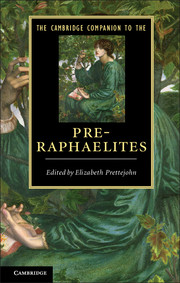Book contents
- Frontmatter
- Introduction
- PART ONE PRE-RAPHAELITISM
- PART TWO PRE-RAPHAELITES
- 6 The poetry of Dante Gabriel Rossetti (1828–1882)
- 7 The painting of Dante Gabriel Rossetti
- 8 William Holman Hunt (1827–1910)
- 9 John Everett Millais (1829–1896)
- 10 Ford Madox Brown (1821–1893)
- 11 Christina Rossetti (1830–1894)
- 12 Elizabeth Eleanor Siddall (1829–1862)
- 13 The writings of William Morris (1834–1896)
- 14 The designs of William Morris
- 15 Edward Burne-Jones (1833–1898)
- 16 Algernon Charles Swinburne (1837–1909)
- 17 William Michael Rossetti (1829–1919)
- 18 Envoi
- Appendix 1 The contents of The Germ
- Appendix 2 The Pre-Raphaelite ‘list of Immortals’
- Guide to further reading and looking
- Cambridge Companions to …
- Index
6 - The poetry of Dante Gabriel Rossetti (1828–1882)
from PART TWO - PRE-RAPHAELITES
Published online by Cambridge University Press: 28 September 2012
- Frontmatter
- Introduction
- PART ONE PRE-RAPHAELITISM
- PART TWO PRE-RAPHAELITES
- 6 The poetry of Dante Gabriel Rossetti (1828–1882)
- 7 The painting of Dante Gabriel Rossetti
- 8 William Holman Hunt (1827–1910)
- 9 John Everett Millais (1829–1896)
- 10 Ford Madox Brown (1821–1893)
- 11 Christina Rossetti (1830–1894)
- 12 Elizabeth Eleanor Siddall (1829–1862)
- 13 The writings of William Morris (1834–1896)
- 14 The designs of William Morris
- 15 Edward Burne-Jones (1833–1898)
- 16 Algernon Charles Swinburne (1837–1909)
- 17 William Michael Rossetti (1829–1919)
- 18 Envoi
- Appendix 1 The contents of The Germ
- Appendix 2 The Pre-Raphaelite ‘list of Immortals’
- Guide to further reading and looking
- Cambridge Companions to …
- Index
Summary
At a time when poetic originality in England might seem to have had its utmost play, here was certainly one new poet more, with a structure and music of verse, a vocabulary, an accent, unmistakably novel, yet felt to be no mere tricks of manner adopted with a view to forcing attention – an accent which might rather count as the very seal of reality on one man’s own proper speech; as that speech itself was the wholly natural expression of certain wonderful things he really felt and saw ... That he had this gift of transparency in language – the control of a style which did but obediently shift and shape itself to the mental motion, as a well-trained hand can follow on the tracing-paper the outline of an original drawing below it, was proved afterwards by a volume of typically perfect translations from the delightful but difficult ‘early Italian poets’; such transparency being indeed the secret of all genuine style, of all such style as can truly belong to one man and not to another.
Walter Pater, ‘Dante Gabriel Rossetti’ (Appreciations)The translation of culture
Published a year after Rossetti's death in 1882, Pater's essay remains perhaps the single best study of Rossetti's poetry we have. It is certainly the place to begin examining what Rossetti accomplished and why he was, as Ruskin and Pater thought, the most important aesthetic figure to emerge in the second half of the nineteenth century in England.
Paradoxical though it may seem, Rossetti's poetic innovations and ‘originality’ are a direct consequence of the ‘typically perfect translations from the delightful but difficult “early Italian poets”’ that Rossetti published in 1861. Pater seems not to have known that these translations were produced before Rossetti wrote any of his celebrated ‘original’ poetry. But nearly all of Rossetti's verse before 1847, when he wrote his famous signature poem ‘The Blessed Damozel’, was translation work of some kind.
- Type
- Chapter
- Information
- The Cambridge Companion to the Pre-Raphaelites , pp. 87 - 102Publisher: Cambridge University PressPrint publication year: 2012
- 1
- Cited by

